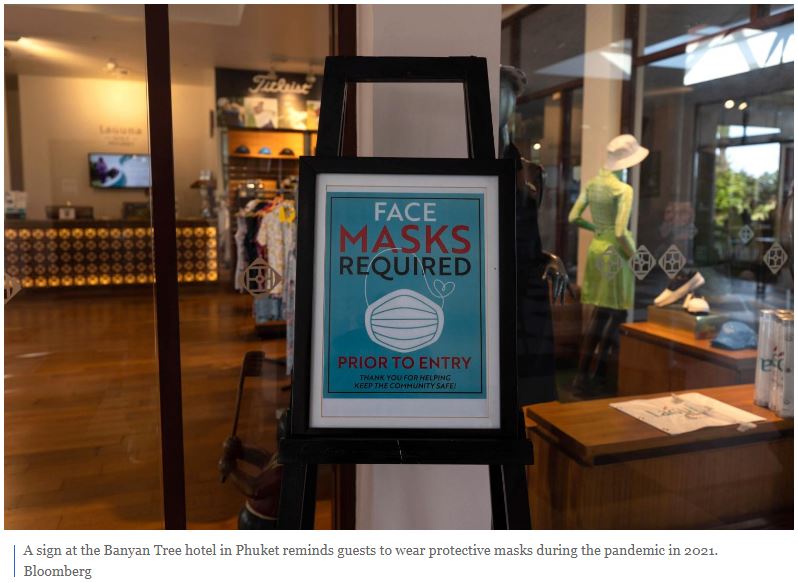Thailand: The disappearing hotel
After a full two years of idling rooms, dwindling guest numbers and shrinking services, hotels across Asia are turning on the fairy lights once again. But returning guests gratefully collapsing at the altar of five-star devotion would do well to examine the miracles of 2022 with a healthily jaundiced eye.
As with the nouvelle cuisine trap, the art of the restart revolves around the promise rather than any proffered tangibles. That one buttered pea rolling around your expensive bone china plate and the boast of a brand marquee that excites iPhone shutters, is considered enough to silence any dissenting murmurs.
But we also recall that 500-thread-count linen in finest Egyptian cotton, the Bose surround sound, the Carrara marble that moans “Prego” every time you step on it with callused feet, and the butler service to turn on the taps.
So can someone explain to me why there is no master switch and only pre-set light combinations for “romance” or “welcome” or “mood”? Has long Covid reduced big spenders to morons? And do hotel designers ever try out their creations?
I may be an atypical traveller but I have never had my bath drawn or my shoes spirited away by some mysterious being using a valet box. I will admit some hotel toilets have had me flummoxed but, on the whole, I have managed with dignity and pride, even when at a luxury Singapore hotel the 14 kinds of “handcrafted” butter from the Netherlands shrank alarmingly to just one foil-sealed Anchor butter pack with the morning eggs.
If you believe the world is just an illusion, I’d suggest starting your research at the closest luxury bolthole. Stuff has been disappearing from hotel menus, services, rooms, mini-bars and tables faster than you could say Gullible’s Travels. The pandemic simply accelerated an ongoing trend.
BASICS BANISHED
After a few years of firing staff and eliminating service (as in quarantine hotels where guests wail and bang on doors attempting to escape clogged drains and armies of marching bedbugs), many hotels appear to have forgotten the basics.
Algorithms have overtaken human experience. Think cluster managers rather than dedicated managers (victims of the Experience equals Expense School of Management), and labyrinthine robocall menus (far more challenging than Sudoku) rather than humans on the help line.
Zero Covid arrived with its grinning sidekick, Zero Service. This was manna from heaven for mega hotel corporations bloated and burdened by the massive mergers and acquisitions of the past few years. That’s a mountain of debt. It has resulted, not in the pursuit of excellence to win more customers, but in getting rid of happy employees (who smile), general managers (who know their guests’ favourite Scotch and preferred room), and bed turndowns.
Brands have been built on the simple human relationship between hotels and their customers. Take this away and all that’s left is the disappearing hardware and the ersatz decor.
New hotel economics is a bit like the health spa model that charges for not feeding you and then offers colonic irrigation with cheap coffee grounds rather than a decent cup of Joe.
I marvel at all the thought that has gone into this. No wonder it costs the earth. I appreciate a level of care that slims both waists and wallets, expeditiously. Perhaps it’s true that less is more.
EMPTY WORDS ONLINE
Even hotel websites have gone minimal with boilerplate descriptions. As one mega-brand explains, “It orchestrates an experience that is expertly edited to leave only what is truly desired.” Make of that what you will. Stuff is disappearing because some nitwit in an expensive Balenciaga outfit has arrived to “curate” your experience.
There is, however, the allure of Asian diversity. As one Manila hotel puts it: “Enjoy a restorative night of sleep on your plush pillowtop bed.” Its sister hotel in Taipei takes a different tack: “Sleep peacefully … thanks to a plush pillowtop mattress.” Shanghai buzzes: “Slumber peacefully upon cozy pillowtop bedding.” We get the drift.
None mentions what kind of electric socket the bedroom uses nor the voltage nor the number of outlets nor whether the USB sockets are to be found bedside, nor the size of the safe, nor the price of a minibar beer. The sort of minutiae — the questions guests constantly ask puzzled desk clerks — simply does not fit into the grander brand illusion.
This travel-clotting plague has been a midlife wake-up call that the hospitality industry disregards at its peril. Just as there’s a fine line between genius and madness, there’s a razor-thin margin separating brands from blah.
One hotel with a solid staycation takeaway is the Grand Hyatt Hong Kong. General manager Richard Greaves has worked with a trim team, mixing and matching people, often in unlikely ways but with interesting results: “Finance people are helping out at restaurants, in the pastry kitchen and with pool logistics.”
Working out of the box has sparked a collective epiphany of sorts. “This is not about procedure, it’s about getting products right,” he told me. “It has fostered teamwork.
Some good can come out of the Covid slowdown if hotels are listening to staff and guests. It is time to square with reality. Guests need to be recultivated and staff retrained for changing times.
Travellers must be held innocent until proven guilty. And general managers must be hired, empowered and returned to the lobby to welcome the new faces. It’s called hospitality.
Vijay Verghese is a Hong Kong-based journalist, columnist and the editor of SmartTravelAsia.com and AsianConversations.com
Source: https://www.bangkokpost.com/business/2308746/the-disappearing-hotel


 Thailand
Thailand




